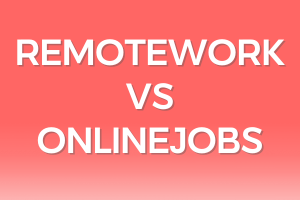
RemoteWork.ph vs UpWork—two giants in the world of remote hiring, but which one fits your needs best? Whether you’re after long-term stability or just need a quick project wrapped up, these platforms cater to different goals. Let’s explore their strengths, differences, and the real benefits they bring to businesses in search of remote talent.
Table of Contents
Understanding RemoteWork.ph & UpWork
How RemoteWork.ph Works
RemoteWork.ph is an exclusive gateway to Filipino talent. It’s tailored to connect employers, often from overseas, with skilled workers based in the Philippines. Unlike traditional freelance platforms, RemoteWork.ph is more about long-term hiring. Whether you’re searching for a virtual assistant, a graphic designer, or even an SEO expert, the platform lets you directly access thousands of profiles of full-time, part-time, and freelance job seekers.
With a subscription, employers can post jobs, browse resumes, shortlist candidates, and reach out directly. There are no middlemen, no bids, and definitely no need to pay commissions—just a subscription model that simplifies the hiring process. If you’re someone who’s after affordability and long-term team members, RemoteWork.ph is designed to give you direct access with minimal fuss.
How UpWork Works
UpWork takes a different approach, focusing primarily on short-term hires for project-based work. It’s a popular freelance platform featuring a diverse talent pool across a variety of industries. Whether you need a quick one-time task completed—like designing a logo, writing a blog post, or developing a small feature for your website—UpWork provides freelancers who are ready to jump in and get the job done.
The hiring process on UpWork involves posting your job and receiving bids from freelancers interested in your project. You choose who to work with based on their profiles, reviews, and proposals. It’s a competitive marketplace where freelancers pitch their services, often leading to competitive pricing. UpWork also offers tools to manage contracts, set payment milestones, and track hourly work, ensuring that both parties are on the same page and that projects are completed efficiently. This structure works particularly well for those looking for short-term solutions rather than a long-term commitment.
Business Models and User Experience (RemoteWork.ph vs UpWork)
RemoteWork.ph Model and Experience
RemoteWork.ph operates on a subscription-based model, and this directly impacts the user experience. It’s a straightforward affair—you pay a monthly fee, and you get access to the talent pool without any ongoing commissions. There are no frills or complications; it’s just you and the talent.
The website itself is relatively simple compared to larger platforms, but this isn’t necessarily a drawback. The clean and uncomplicated design makes it easy for you to search, filter, and connect with candidates. For employers seeking long-term staff, this no-nonsense approach saves lots of time and money.
UpWork’s Model and Experience
UpWork uses a commission-based model with additional membership options. You can choose between fixed-price contracts or hourly work, and both parties have certain guarantees to reduce risk. UpWork’s fee structure—charging both clients and freelancers—ensures that the platform itself functions as a mediator, adding a layer of security but also some cost.
The user experience on UpWork is undeniably more polished. There’s a sophisticated interface with advanced filtering options, portfolios, and badges that highlight a freelancer’s credibility. You get a wealth of information at a glance, which makes it easy to evaluate and select the best person for the job. However, this complexity means there’s also a bit of a learning curve, and you’ll need time to master the ins and outs of the platform.
Talent Pool and Hiring Process – (RemoteWork.ph vs UpWork)
RemoteWork.ph’s Talent Pool
RemoteWork.ph is exclusively for hiring Filipino workers, and that’s its biggest strength and its biggest limitation, depending on your needs. The Philippines is known for having a highly skilled workforce, especially in virtual assistance, graphic design, content writing, and digital marketing.
The hiring process is more akin to traditional recruitment. You browse through profiles, post jobs, and reach out directly to the individuals who catch your eye. You won’t see freelancers pitching you proposals—it’s more about you seeking out the right fit. This approach suits those who want a stable, long-term employee rather than someone for gig work.
UpWork’s Talent Pool
UpWork’s talent pool is vast and diverse, comprising millions of freelancers from all over the world. You can find specialists in just about anything, from software development to accounting to highly niche services like voice-over acting in specific accents.
The hiring process is very dynamic. You post a job, receive multiple proposals, and choose from a range of applicants. This competition drives freelancers to present their very best. However, it also means that sorting through proposals can sometimes be overwhelming. The advantage is having a variety of skills at your fingertips, with freelancers ready to work immediately.
Tools for Management and Collaboration (RemoteWork.ph vs UpWork)
RemoteWork.ph’s Tools
When it comes to management tools, RemoteWork.ph keeps things simple and straightforward. It provides a basic communication channel, allowing employers and workers to connect directly, but it doesn’t come with built-in features for detailed task tracking or project management. Instead, you’ll need to use third-party software like Trello, Asana, or Slack to keep track of tasks and collaboration.
For many businesses, this simplicity is a benefit. It means fewer tools to learn, lower costs, and more freedom to use the management systems you already prefer.
UpWork’s Tools
UpWork, on the other hand, offers a comprehensive set of management tools integrated into the platform. You can use UpWork’s time tracker for hourly contracts, set milestones for fixed-price projects, and communicate directly with freelancers. The time-tracking feature even takes screenshots to provide accountability and ensure productivity.
This all-in-one approach makes managing projects more seamless for those who want everything in one place. However, this convenience comes with added costs, and the range of features can take some time to fully understand and utilise effectively.
Pricing and Fees (RemoteWork.ph vs UpWork)
RemoteWork.ph’s Pricing
RemoteWork.ph keeps things simple: it’s a subscription model. You pay a monthly fee, and that’s it. There are no additional costs based on how much your employees earn or the number of people you hire. Plans start from relatively low rates, which makes it an attractive option for small businesses on a budget.
This flat-fee approach means that employers have predictable expenses each month, which is great for financial planning.
UpWork’s Pricing
UpWork’s pricing structure involves commissions for both clients and freelancers. Typically, freelancers are charged a service fee, which starts at 20% for the first $500 billed with a client and decreases thereafter. Clients are also charged a small processing fee for each payment made. While this fee model makes UpWork profitable, it can add up quickly, especially for smaller jobs or recurring projects.
There are optional paid memberships that allow employers to access extra features and more premium talent, adding flexibility but also additional cost.
When to Use UpWork
Use UpWork if you’re in need of short-term help or a one-off project. If you don’t mind dealing with frequent turnover and hiring new freelancers repeatedly, then UpWork’s model might suit your needs. It’s a decent choice for specialized tasks or when you require specific skills quickly, but be prepared for freelancers who may come and go as soon as the project ends. While UpWork provides a variety of management tools and a diverse talent pool, relying on freelancers who may not be invested in your company long-term can lead to instability—something that can hinder the growth of your business over time.
When to Use RemoteWork.ph
RemoteWork.ph is the perfect choice if you’re seeking a committed, long-term addition to your team. It’s designed for businesses that value stability and want to build lasting relationships with their remote staff. If you need consistent support from someone who can grow alongside your business, RemoteWork.ph delivers. The cost-effective subscription model means there are no surprise commission fees, making it ideal for startups and companies looking to expand steadily. It’s particularly well-suited for employers who already have their preferred management tools in place and want control over how tasks are organized and tracked, without the constant hassle of rehiring.
Advantages of RemoteWork.ph & UpWork
Advantages of RemoteWork.ph
- Direct Hiring with Less Turnover: RemoteWork.ph allows you to connect directly with candidates, without any middleman or bidding process. This means you get to hire skilled professionals who are committed to long-term roles, reducing the risk of constant turnover and providing stability for your business.
- Highly Skilled Filipino Talent: The platform specializes in connecting you with Filipino professionals, known for their excellent English skills, adaptability, and understanding of Western culture. This makes communication seamless and ensures they align well with the needs and expectations of international businesses.
- Affordability and Simplicity: The straightforward subscription model means there are no hidden fees or commissions, making RemoteWork.ph a budget-friendly option for companies looking to hire dependable remote workers without breaking the bank.
Advantages of UpWork
- Diverse Skill Set: UpWork offers access to a wide range of talents from around the world, making it a decent choice if you need a specific one-off project, like designing a logo or writing a quick article.
- Built-in Management Tools: The platform provides tools like time trackers, milestone payments, and integrated communication, which can be handy for short-term projects that need quick oversight and minimal long-term management.
What Happens After You Hire? (RemoteWork.ph vs UpWork)
RemoteWork.ph
Once you hire through RemoteWork.ph, you gain the big advantage of direct management—just like hiring a traditional employee. There are no ongoing platform fees or monthly agency costs because you’ve hired directly. You set up payment, schedules, and tracking according to your own systems, providing you with complete control over how the work is managed.
This DIY approach is perfect for those who want to build a trusted working relationship without the constraints and fees of third-party oversight. The result? A consistent budget, a long-term team member invested in your company, and freedom from extra charges, allowing you to allocate resources more efficiently and effectively.
What Happens After You Hire?
UpWork
After hiring through UpWork, the platform continues to stay involved, and with that comes ongoing costs. UpWork’s time tracker and milestone system help manage projects, keeping both parties aligned on progress and payments. You also have the convenience of communicating directly through the platform, with everything in one place for easy reference.
However, it’s important to remember that you’ll be paying commission fees for as long as you work with the freelancer. These fees are ongoing and can add up over time, making long-term collaboration more expensive compared to direct hiring. While UpWork’s structure can be helpful for managing short-term or complex projects, the continuous platform fees can be a burden for those looking to establish lasting relationships without added costs.
Which Should You Choose?
When to Use RemoteWork.ph
RemoteWork.ph is perfect if you’re looking for dedicated, long-term remote talent to become an integral part of your team. This platform excels in connecting you with highly skilled Filipino professionals, making it a go-to choice for those wanting reliable virtual assistance, content creation, graphic design, and more—without the constant need to switch contractors. With its flat monthly subscription, you can easily manage costs without worrying about escalating fees or surprise commissions.
If you appreciate a straightforward, no-bidding approach where you have direct access to talent, RemoteWork.ph is the clear winner. For small businesses, startups, or even larger organisations seeking consistent support from professionals who grow alongside your business, RemoteWork.ph offers the simplicity and affordability that makes remote hiring stress-free.
When to Use UpWork
UpWork offers the benefit of flexibility and a wide range of specialized skills from freelancers all over the world. If you have a specific short-term project, or you’re looking for niche expertise for a one-off task, UpWork’s diverse talent pool is an excellent resource. You can tap into a variety of skills quickly and efficiently. The structured system—complete with milestones, time tracking, and payment security—adds a layer of convenience, especially for complex projects.
However, with UpWork’s commission fees and competitive bidding environment, it can sometimes feel overwhelming, especially if you’re planning for a longer-term arrangement. For businesses seeking continuity, consistent support, and cost-effectiveness, RemoteWork.ph presents a more streamlined and budget-friendly solution. Use UpWork for those unique, short-term needs, but when it comes to building a dependable, long-term remote team, RemoteWork.ph stands out as the smarter, simpler choice.



